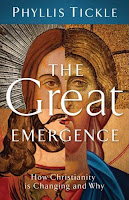Phyllis Tickle, The Great Emergence: How Christianity is Changing and Why. Grand Rapids, MI: Baker Books, 2008.
Phyllis Tickle says about every 500 years the church has a giant rummage sale. What she means is that every 500 hundred years or so, the church structures and strictures are formed into an intolerable chain which must be broken for the church to continue to be faithful to the gospel. She cites the Council of Chalcedon (451) as the beginning of one such sale, and the Monastic reaction to the Constantinian control of the church as its counter balance. The first rummage sale was circa 500 AD. The others are the great Schism of east and west around 1000 AD, the Reformations around 1500 AD, and the current post-modern shift around 2000 AD. Tickle argues that the dark days and deeds of the institutional church spring from the old system desperately clinging to a fading hegemony. Tickle maps the road ahead, noting that the church exists now in four quadrants: Liturgicals, Social Justice Christians, Renewalists (Charismatic), and conservatives. Liturgicals & Social Justice Christians focus on Orthopraxy. Renewalists and conservatives focus on Orthodoxy. She recommends a migration to the center of all four and a focus upon what she terms in a sort of neologism, “Orthonomy.” This means a right beauty or harmonic purity which grows out of the intersection of orthopraxy and orthodoxy. Along with this term she engages the term “Theonomy,” referring to the idea that the principle that only God can be the source for perfection in action and thought. Tickle stutters through her iteration of cliché terms like centered/bounded set, narratives and her issues with Constantine.
Tickle essentially argues for a Vineyard type community as the proto-type for emerging churches. I’m certainly sympathetic to Tickle’s reading of the macro-historical trends of the past 2000 years in regards to the Christian church. I have some affinity toward her argument for orthonomy and theonomy as the way forward in the church. However, I do think Tickly primary contribution here is helping post-moderns to make a mental map of where we are right now. Like a rise in the road in an otherwise flat landscape, Tickle lets us see beyond our usual horizons so as to begin to spark new imagination and a way forward.













